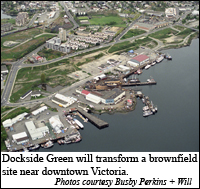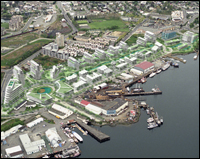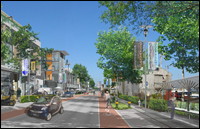Dockside Green recognized for sustainable design
 Victoria, Canada - The Dockside Green development in Victoria is seeking to become the first LEED Platinum certified community in Canada.
Victoria, Canada - The Dockside Green development in Victoria is seeking to become the first LEED Platinum certified community in Canada.
The project is based on a comprehensive environmental, social, and economic planning philosophy that has attracted considerable attention from around the world.
In the past month, the project architects and developers and the City of Victoria have won awards for the development.
Smart Growth BC presented an award for the proposal and planning process, which included community participation and was founded on twelve guiding principles to support the ‘triple bottom line’ of social, economic and environmental performance.
“This collaborative approach among the developer, City and local community built trust, expedited the approvals process and allowed the neighbourhood to embrace a large development at its core with excitement and anticipation,” noted Smart Growth.
More recently, at its 2006 National Urban Design Awards the Royal Architectural Institute of Canada awarded a certificate of merit for Approved or Adopted Urban Design Plans to Dockside Green architects, Busby, Perkins + Will. The award was presented on June 17th, marking the beginning of the World Urban Forum III, an international conference on urban sustainability.
Dockside Green is an important project for the revival of Victoria, representing the chance to reclaim an 11 acre brownfield site located near the heart of downtown to create a socially diverse and economically viable neighbourhood.

Windmill Developments, the principal proponent, proposed a development plan that includes one-million square feet of mixed-use buildings, as well as community-wide strategies for transportation, energy, water, and social diversity.
These features go beyond striving for the LEED Platinum rating, which has only been awarded to a handful of buildings worldwide. Dockside Green aims to be greenhouse gas neutral, through use of a biomass energy cogeneration system which will produce heat and power from wood waste obtained from local industry, a geothermal heating system, solar water heaters, and other renewable technologies.
A biodiesel production facility has arranged to lease a building on the site and will participate in community demonstrations. Dockside will act as a showcase and testing ground for renewable technologies, with a particular emphasis on Canadian-made products.
All sewage will be treated onsite to far exceed outfall requirements set by the Ministry of the Environment, using a membrane filtration system which includes the ZeeWeedTM membrane manufactured by Canadian-based Zenon. In addition, on-site treatment for grey and black-water will be provided, and no potable water will be used for irrigation or toilet flushing.
To further promote sustainability, the transportation strategy includes the provision of car sharing, a mini-transit system using biodiesel produced onsite, and integration of bicycle and pedestrian walkways to encourage alternative transportation.

As Peter Busby, principal architect for the project explains, “We are really looking beyond the building now to design a community, not just the initial structure. We use green building techniques and LEED as a component of our overall thinking, but we are extending our planning to include diverse issues such as transportation, waste and water management, ecological placement, and other community impacts.”
Through the use of Canadian environmental technologies and sustainable planning innovations, Dockside Green hopes to set the standard for the LEED Neighbourhood-Rating system, which is currently under development. As a demonstration project for the Canadian Brownfields Network, the site will also help developers, municipal officials, and financiers in other areas of the country.
With projects like Dockside Green, Canada can demonstrate leadership to the world in sustainable community planning and building design, creating an overseas market for this knowledge-based economy.
Another project in which Canada is leading the way is the soon to be developed Centre for Interactive Research on Sustainability (CIRS) in Vancouver, a living laboratory that will push the frontiers of green building in all areas. With an eventual goal of being energy neutral and using world-leading techniques in air filtration, water management and construction methods, the facility will be a flagship for sustainability around the world.
You can return to the main Market News page, or press the Back button on your browser.

